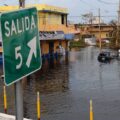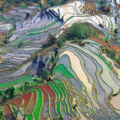Speak, Disaster: A Climate Change Anthology from India

Witnessing the policemen going door-to-door and collecting vegetables, eggs, fruits, grains, and milk for the mass burial to prevent radiation exposure after Chernobyl, Svetlana Alexievich understood the limitation of human language to describe disasters. She explained that writing the experiences of disasters would be a long-haul task and only be possible in a book buzzing in a beehive of voices—where lots of people can make contributions; one person may speak half a page, someone else a paragraph or five pages.
This loss of language when confronting disasters—the inadequacy of our knowledge or imagination to match up to our experiences, is what constitutes the great derangement, according to the Indian author Amitav Ghosh. This inability is most palpable in fiction, particularly the literary novel, which tends to conceal the improbable and focus on the tribulations of the every day—marriage, social status, careers, murder, the rearranging of furniture. Poetry, on the contrary, has always reveled in its intimacy with climatic events. Amitav Ghosh, in The Great Derangement, notes that Milton composed Paradise Lost in winter of unusual and extreme cold. Indeed, climate change and its resulting disasters have been serialized in several recent poetry anthologies, proliferating a relatively new genre, ecopoetics or ecopoetry.
Open Your Eyes: an anthology on climate change, edited by Vinita Agrawal (Hawakal, 2020) is a valuable addition to the genre, perhaps the first to come out of India, which notably includes The Ecopoetry Anthology, Earth Songs, Black Nature, The Thunder Matters: 101 Ecopoems among others. As the name suggests, Open Your Eyes invites the readers to look at our environment anew, to see it with tenderness, as a pre-requisite to healing. It implores us to shed our current perceptions without ignoring the harms that have been wreaked upon our planet by human activity. The anthology searches for a language that could make real, tangible change possible.
The anthology begins with a meditation on Nature’s magnanimity, who, like a gracious sovereign, allows each of the inhabitants to make its mark without discrimination. For a fox, it may be a paw print—for a whale, it is the drifting shadow—for humans, it is drilled shale, plastic whorls. In the opening poem “Sovereign,” by Ranjit Hoskote, these environmental impacts are juxtaposed to devastating effect:
What washes up
is drilled shale lost static parsed from gulf to strait
plastic whorls in whose wake gagged dolphins trail
scarred humpback whales whose shadows
will drift unmoored up thawing glaciers
Subtlety lends poetry so much of its power, and this subtle but damning juxtaposition sets the mood of the anthology. Without being overly moralistic, the poems compel us to assume responsibility for climate change, nudging us to see how our footprint has contaminated the homes of so many other beings.
a shore
that on a compass dizzy with wind-scattered directions
she can and can’t call home
Ecopoetry is indeed not art for art’s sake, and like any art with a political purpose it runs the risk of becoming mere essays in verse. The poems here are able to enlarge the realm of nature poetry, rather than supplanting it, giving voice to the apprehensions of our real biological, economic, and cultural selves.
“Water Wars” by Ruth Padel reflects upon the disconnect humanity has forged between itself and Nature by treating it only as a source of raw materials for satisfying its consumerist urges—some of which are market-driven and conditioned. The poem perhaps mocks our idea of connection by putting a finger in our eyes and asking us to look.
of your river when they extract
the aluminium
which will connect
your SIM card with the world.
As surfaced at the beginning of this review, one crucial aspect of climate change is also repeatedly highlighted in the anthology—and rightly so—is a language difficulty. This search for a language for not only expressing our disenchantment with our actions but also for bringing in real change around us is felt in these lines from Padel:
because reality is not quite real enough
till pushed through the mesh of words
But are words enough to steer the conversation around climate change? Jayanta Mahapatra in “I am Today” suggesting their fragility, writes:
I write a poem whose words
fall to pieces
The speaker of this poem could be the planet herself, bemoaning the dissolution of its sound—a language made through the agency of her orioles and sparrows—to be replaced with the activities that keep a market economy running.
Walk through it, it smells of blood
and paint, petrol and cement,
lipstick and factory waste,
and the death murmur of trees
To make up for the loss, the poet urges to cry, perhaps as a last resort, to condense all sounds into some language that can give voice to the silence of the earth.
Cry, children
cry the silence of the earth
as you drift down without echo
the silk-stockinged sleepless city.
In Usha Akella’s “Adam Walking Backward,” one feels that the destruction begins when language is lost. There will be words, but the meaning disappears. Only the cadences remain. It’s as if the loss of words is more a pre-condition for disaster than its effect.
Disappearing names knelled in the cave of history
like arcane Sanskrit chants; we cremate ourselves,
species by species, piece-by-peace,
this is Adam walking backward, taking his
names back, giving back the apple to Eve
K. Srilata’s “Reading at One Remove” suggests the role language played as an interlocutor between humans and their environment:
earth language from another time,
that could summon rain
and tall blue hills
and kurinci flowers
The poem posits that, perhaps, rediscovering such a language can heal our environment. It also shows what healing would look like:
she swims
in the blueness of rain fall, hills and kurinci blossoms,
forgets, briefly,
the paalai that is her body
Healing may entail self-abnegation, but isn’t the self created in some market image, an economic being, given into consumerism? Well-known anthropologist and historian Yuval Noah Harari writes that one of the few iron laws of history is that luxuries tend to become necessities and spawn new obligations. Kiriti Sengupta’s “Coterie” echoes this sentiment and asks pointed questions about our consumerist obligations.
Neonates feed on supplements. Does frondescence succor wellbeing? Air-conditioning helps appraise accommodation. Windowpanes don’t open to the sky. Owners enhance décor with filament lights. A flame tree stands alone beside the gateway. Old leaves cover the passage. Wood is abolished to expand highways. The flamboyant tree dies from Roman vitriol.
Nabina Das in “Anima Sings to Earth and Death” further reflects how the market controls many aspects of our lives; our morning rites have changed, we wake up and rush to soothe our economic selves:
The day breaks like a forgotten prayer. Everyone scurrying to work as usual—kids to school, harried people in ill-fitted clothes to office, and vendors and shopkeeper to their stations and stalls… Inside the heart of this strange apocalyptic flower called life, human bees are rushing to the poison nectar.
The poet hints that even if some solution to the current crisis comes, it would be governed by profits: “Perhaps this freshness will be bottled and sold in some near dystopic future.” Does this mean we’re trapped in this morass of market and consumerism? Will there be a balance between environmental and economic persuasions? Answering this question is like harmonizing our inner spiritual world with our external material world. Bina Sarkar Ellias shines light on this connection of internal and external in “Ode to Planet Earth”:
do you recall
how in your youth
the sky was blue
and you breathed truth?
Similarly, Adil Jussawala’s “Climate Change” asks:
how long back did we stop in our tracks,
preferring muck to air, feasting to tending?
A deformation has occurred, a change that fundamentally distorted us from Nature’s caretaker to the consumer of nature—a diminished existence. This disconnect of internal and external is echoed in Sudeep Sen’s “Disembodied,” where the poet juxtaposes the spiritual and natural elements of anatomy and the environment with the manufactured, toxic components that fill it:
My flesh sculpted from fruits of the tropics,
blood from coconut water,
skin coloured by brown bark of Indian teak.
My lungs fueled by Delhi’s insidious toxic air
echo asthmatic sounds, a new vinyl dub-remix.
The anthology also explores witness. Here, the poetic voices are the strongest, exercising our environmental imaginations, forging empathy beyond the human sensibilities, expanding our ethical spheres, as in Smita Sahay’s “Warm Dirt”:
At what depth did death arrive?
Did they embrace?
Were their faces a cartography
of tears that boiled
before they could dry up?
Did they choke on words
composed of coal dusts?
Ayaz Rasool Nazki witnessing a “Morning At a Dying Lake,” writes:
Bees after a night sojourn
Crowd around the lone daffodil
On the bank
A butterfly wades through the morning air
And the big beaked kingfisher
Angles for fish
That no longer exist.
In “The Danish Fort” by Sukrita Paul Kumar, an ode to Nature as an object of history, historicity and timelessness are juxtaposed. It portrays humanity and its relationship with Nature—the latter is eternal and the former, temporal. Nadeem Raj recounts the recent Australia wildlife fire in “Koalas,” meditating how the event may leave its mark in our language:
Petrified like a lonely koala shivering under the patterns
Of a demonic red sky, surrounded by fiery yellow walls
Closing in on all sides not knowing
What you’ve done to be punished so finally
The poem opens our eyes as to how much of humans’ actions have repercussions in distant lands and how much more we are linked on this earth than often thought. This awareness should instill in humans some responsibilities toward the planet earth.
Ecopoetry—inspired by environmental degradation and ecological disaster—can be depressing. But there is hope. Open Your Eyes carries the conversation forward in poems of healing, such as Rochelle Potkar’s “Saturnalia.” It portrays a friendship between Carlos, a honeybee and environmental refugee from urban space, and Kartick, a man who runs away from his criminal past. “Saturnalia” performs the delicate task of anthropomorphizing the honeybee by skillfully recognizing, and not projecting, the human attributes on Carlos.
A key objective of ecopoetry is to help the readers feel and imagine the non-human interlocutors of their environment, rather than possess them. Anthropomorphism suggests that humans are not unique in the larger ecosystem, not the sole conscious living beings, which is a necessary pre-condition for environmental healing.
Indira Chandrasekhar’s prose, “Do I See Sunshine?” brings in a much-needed focus on ecofeminism. It is a substantial piece raising moral and ethical questions of a female body, caught up in a catastrophic situation, the nexus between disaster and power. “Arid” by Vinita Agrawal, considers women’s burden:
Rain could ease the ache of this supine topography.
Rains and rivers and water tables.
That brilliant liquid
shimmering in dreams
that women would trade with their blood.
…
But clouds too are desert here,
deserts in the skies.
Much of the discourse around climate change and global warming involves governments, corporations, and policy-makers. This has evolved a language that avoids commitments and focuses on getting away with minimum emission reduction. The convoluted jargons of climate change, comprising few buzzwords, have been mastered by expert negotiators and deal-makers.
The language of climate change must evolve to include various species as well as women and the perspectives of rural and indigenous people, folks who lose their homes in each calamity with increased regularity. Wittgenstein declared that the limit of my language is the limit of my world. It is imperative for poets and writers to stretch the language to include as many realities as possible. Open Your Eyes pushes that limit. It may only be a nudge, but the task has only begun.
About Tabish Nawaz
Tabish Nawaz is Assistant Professor of Environmental Science and Engineering at IIT Bombay. Their debut short story collection, Opening Clouds, Fermented Rain appeared from Hawakal Publishers in 2020. Nawaz's essays, short stories and poems have been published in Ethos Literary Journal, The Punch Magazine, The Conversation, Indian Review, and The Bangalore Review among others.





